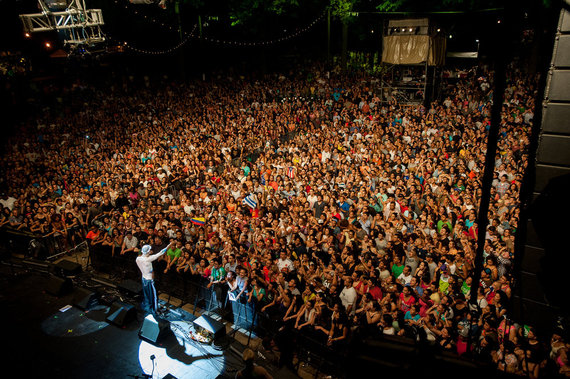Recently, I've helped a number of artist-oriented music apps develop business partnerships around the globe.
While they come from widely different backgrounds, all of these apps seek the same goals: grab an artist's audience, engage them, and monetize that engagement, digitally of course--with advertising, brand sponsors, "in app" purchases, or on rarer occasions, by selling recorded music.
Most of these apps want to tap into the perceived business potential of an artist's community--to get that artist to tweet or give a shout out on Facebook to drive usage of the app, driving consumer engagement and setting the stage for their app's business to flourish.
And the smartest ones navigate away from the complex issues of music or artist rights--they simply want to position themselves to capture the potential of those fans.
Some of these apps are beautiful, sophisticated digital products, too, bringing elegant designs, knowledge, and impressive experience from backgrounds as wide as games, broadcast radio, mobile payments, and even financial services.
All have grand growth plans, and many have highly opinionated and successful entrepreneurs behind them, too. Some of these entrepreneurs even think they can jump in and reinvent the music business. It's Steve Jobs all over again--multiplied and atomized across a wide group of tiny new music apps. The thinking goes that there's no reason the music business can't change and function just like, say, a game publishing business does, or even an over the top video service.
It's great to experience energetic app entrepreneurs intent on changing an industry. It's even better to have the chance to work with the teams behind these apps, too.
But it's a rare skill set that fully appreciates how to navigate and capture the opportunity and complexity in front of these new apps.
Here are a couple things I've heard while working with this new, enterprising group of artist apps:
"We're bringing new, incremental revenue to the table, the artist will be happy to have us."
"We're a bridge to a strategic business area that artists and labels have never participated in--it's a fantastic opportunity for them."
"We're going to be a one-stop source for anything a consumer could need for its favorite artist. Why would they go anywhere else?!"
"We have a major partner like (insert label/manager here) who is going to make sure their artists will participate"
"We'll manage the artist app for free!"
"We'll offer some equity, too."
"We're already closing with some rappers"
And of course, my favorite: "Just tell them we're the coolest app around, and the coolest way to get to a millennial. That'll work."
Rather than criticizing, here are some hopefully constructive thoughts on how to move forward in the new artist app landscape:
First, recognize that your app is one part of a crowd of music apps, each competing for the same fan's attention. I've counted more than ten of these artist apps in the US alone, and that's probably only a fraction of how many are actually out there. Find a way to differentiate yourself from that flock, communicate that distinction clearly, and stay on message.
Second, even if you have limited familiarity with the industry that produced the very artists you target, learn to respect and embrace the business interests, nuances and complexity that produced that artist. I'm not talking about artistic nuances--I mean learning the structure and fundamentals of the music industry, where those rights lie, where decision-making authority actually is, and how to go about getting a commitment to move forward. (Find someone to help if you can't.)
Third, and most critically, try to put yourself in an artist's shoes. Develop an understanding of what would it would take to actually motivate an artist to commit to and embrace that app.
Finally, while no music app executive wants to hear this: for an artist to truly take an app proposal seriously, it needs a very attractive compensation structure--including guaranteed and "upfront" compensation, too.
Imagine what it's like as an outsider, trying to make these arguments to a major artist manager, whose own daily routine is so busy that just getting their attention is a big challenge.
Most managers are already busy managing their touring and travel needs, recording sessions, staying on top of their latest label deal, and of course, trying to get paid, too. A call or meeting with an unknown new app is probably not a very big priority for that manager, especially if nothing about that app cuts through the clutter and really speaks to their needs.
Artist and major celebrities have dozens of new business opportunities in front of them--from apps to brands, even games and perfumes. The bigger the artist, the more opportunities they see, and the more likely that artist is to demand a very strong business proposition along with real insights into that app--the team, their track record and reputation, their app's true identity and goals.
In short, an artist wants to weigh any commitment they would make to you against all they others they've already made.
Today's recorded music industry is roughly half the size it was a decade ago, and new revenue sources are more precious than ever for every artist or record label. That app isn't landing in a vacuum--it's more like landing in a pool with many different varieties of hungry fish in it.
Most artists rightfully see their commitment and endorsement as being fundamental to making a new app, brand, or product succeed. It's their name and community after all, and many spent years building that community.
So while that app may be great and even a bit revolutionary, it's not enough to tell them you've got a great product and you'll bring them new revenue. Bring them more, put more on the table, and they'll listen, and maybe even commit, too.

